May 3, 2021
Masako Toki
On April 17th, 2021 high school students from Russia, Japan, and the United States joined the online Critical Issues Forum (CIF) Spring Student Conference. The Critical Issues Forum (CIF) aims to promote nuclear disarmament and nonproliferation education to high school students while helping students develop critical thinking skills and cultivate cross-cultural communication. CIF is coordinated by the James Martin Center for Nonproliferation Studies (CNS) at the Middlebury Institute of International Studies at Monterey (MIIS).
The COVID-19 pandemic has taught us how interdependent we are, whether we like it or not. It also has highlighted the urgent need for greater international cooperation, if we are to have any chance of successfully tackling any number of existential threats, such as those posed by nuclear weapons. This cooperation requires concerted engagement of all citizens, especially young people like CIF students.
Opening Remarks
The Spring Student Conference is a culmination of the semester-long CIF project. Each of the participating schools completed a final project associated with this year’s theme, “Toward a World Free of Nuclear Weapons: The Role of Youth in an Age of Global Crisis.” Students successfully completed this year’s project activities while most of the participating schools were teaching remotely. This year’s CIF program was a great testament of how young people can be creative and innovative despite surmounting challenges and that youth participation is a critical component to solving pressing global problems.
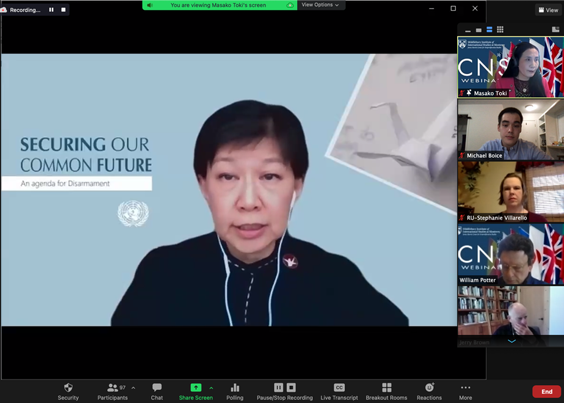
The conference opened with remarks from the Critical Issues Forum Project Manager, Ms. Masako Toki, and was followed by a video message from Ms. Izumi Nakamitsu, the United Nations Undersecretary General and High Representative for Disarmament. Ms. Nakamitsu encouraged CIF students to “put knowledge into practice to make this world safer, more secure, and sustainable for all.”
Keynote Speech
Next, CNS founding director Dr. William Potter introduced former Governor of California Edmund G. (Jerry) Brown Jr. as the keynote speaker. Governor Brown is a passionate advocate for nuclear disarmament and nonproliferation, a strong believer in the power of education and the promise of youth, and a longtime friend of CNS.
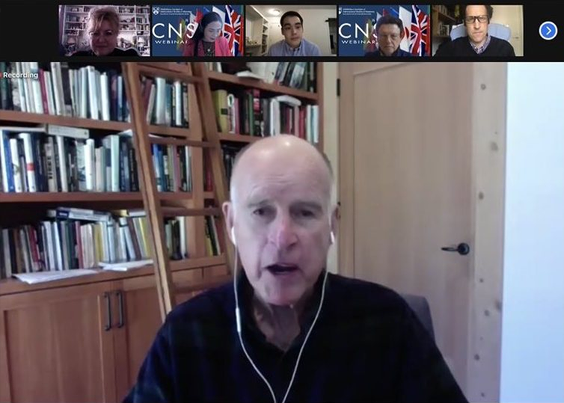
In his impassioned speech, Governor Brown warned participants not to fall into a sense of complacency when we live in a world where nuclear weapons are ready to be used to annihilate our lives and livelihoods. He chastised global leaders and politicians for not having good faith dialogue or negotiations toward arms reduction and urged CIF students to step up and raise awareness on the existential threats posed by nuclear weapons. Addressing CIF participants directly, Governor Brown encouraged youth to mobilize and do everything possible to galvanize the masses to pursue nuclear disarmament. Governor Brown concluded that, “it is still possible… with the right leadership, with the right inspiration, the people of the world can take the steps to pull us back from the brink.” His speech significantly inspired CIF students and drew many enthusiastic and thought-provoking questions from participants.
Students Presentations
High schools that participated in the CIF program worked throughout the semester on project assignments that led to the completion of a final project. Each CIF high school submitted a video recording of final presentations before the conference so that the presentations could be viewed prior to the conference. To accommodate this year’s online environment, the online education platform CANVAS was used to connect students to the conference. Three schools gave a live presentation during the conference, (one from each participating country) and two schools gave a joint presentation.
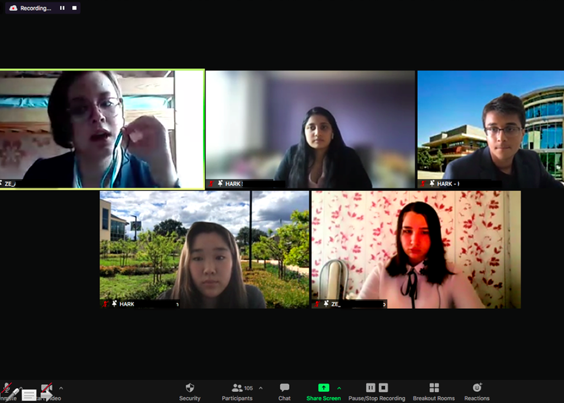
The joint presentation by students from The Harker School in San Jose, California, and School No. 164 in Zelenogorsk, Russia, not only showcased innovative ideas, but also demonstrated how cross-cultural communication and international cooperation is critical to successfully tackling threats posed by nuclear weapons. The collaborative effort was not without challenges. Students needed to overcome language barriers and the 15-hour time difference. As the project progressed, students became more comfortable and were able to learn about each other’s respective lives on opposite ends of the planet. The presentation titled, “Nonproliferation Education and Raising Public Awareness to Promote a Nuclear-Free World,” featured the importance of youth education and collaboration to achieve the noble goal of a nuclear-free world. The students highlighted grassroots and activist movements, along with social media campaigns and advocacy programs as effective tools for raising public awareness and promoting a world free of nuclear weapons.
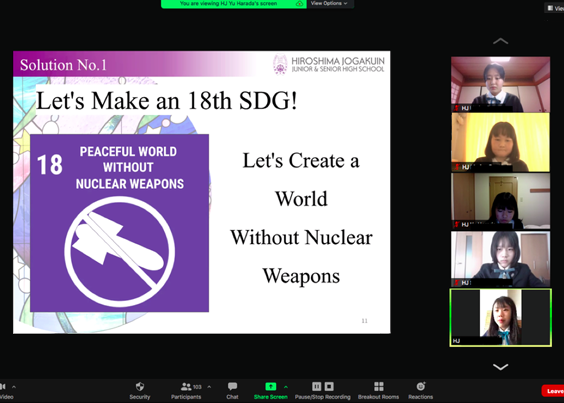
Representing five schools from Japan, 16 students from Hiroshima Jogakuin Senior High School all actively engaged in sharing ideas on how to make progress towards a world free of nuclear weapons. The project focused on tackling the lack of awareness regarding the Treaty on the Prohibition of Nuclear Weapons (TPNW) that entered into force earlier this year. With the increasing interest in the Sustainable Development Goals (SDGs) initiated by the United Nations, students came up with the idea to create an 18th goal to abolish nuclear weapons. In addition, the students underscored the importance of cultural exchanges and international dialogue.
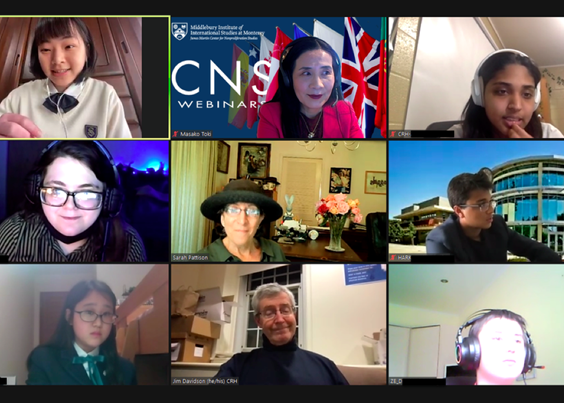
One of the most important aspects of this year’s online conference was for all students to have a chance to share and exchange views on nuclear threats and the CIF experience. For this purpose, the CIF project team carefully planned a Breakout Session that was facilitated by teachers. During the Breakout Session, students were able to present their solutions to global problems posed by nuclear threats, express individual views, and to pose questions to students from other schools and different countries within the small group setting.
CIF Students Are Key Change Agents
Each student and participating school received an Award of Excellence and a Certificate of Completion that recognized the excellent work completed and dedication to the CIF project. Furthermore, this year’s CIF students were each designated as a Youth Communicator for a World without Nuclear Weapons by the Japanese Ministry of Foreign Affairs.
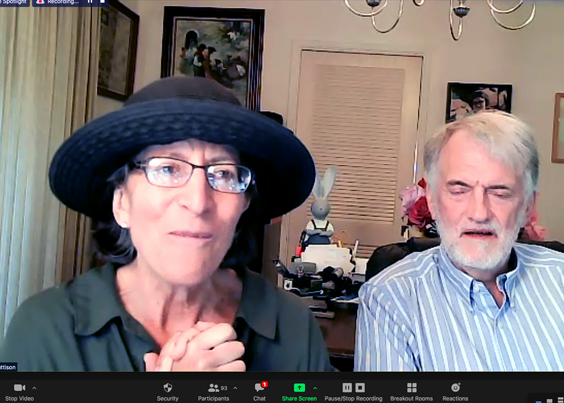
At the closing ceremony, Mr. and Mrs. Tom and Sarah Pattison, who have been supporting the Critical Issues Forum and other youth education programs at CNS for many years, expressed their amazement at the excellent work of our youth participants. The Pattisons were particularly impressed by the commitment of students to work toward a world free of nuclear weapons with concrete action plans.
Despite the CIF activities being conducted fully online this year, we are confident that the 2021 CIF program was able to provide an incredibly valuable opportunity for students to engage in nuclear disarmament and nonproliferation education as well as cross-cultural dialogue. We believe it is no coincidence that cross-cultural communication was highlighted in every student’s presentation. We hope that the CIF project continues to enable a fruitful and constructive conversation toward a world free of nuclear weapons. Young people, like CIF students, are key change agents for our better future.
This year’s Critical Issues Forum project is made possible by funding from the Tom and Sarah Pattison Fund, and the SAGA Foundation.
Participating Schools
U.S.
- Choate Rosemary Hall, Wallingford, CT
- The Harker School, San Jose, CA
- Madeira School, McLean, VA
- Monterey High School, Monterey, CA
- Rock University High School, Janesville, WI
- York School, Monterey, CA
Japan
- Hiroshima Jogakuin Senior High School, Hiroshima
- Kansai Soka Senior High School, Osaka
- Kwassui High School, Nagasaki
- Nagasaki Higashi High School, Nagasaki
- Soka Senior High School, Tokyo
Russia
- School № 41, Novouralsk
- School № 164, Zelenogorsk
For more information, please visit the Critical Issues Forum Website!
